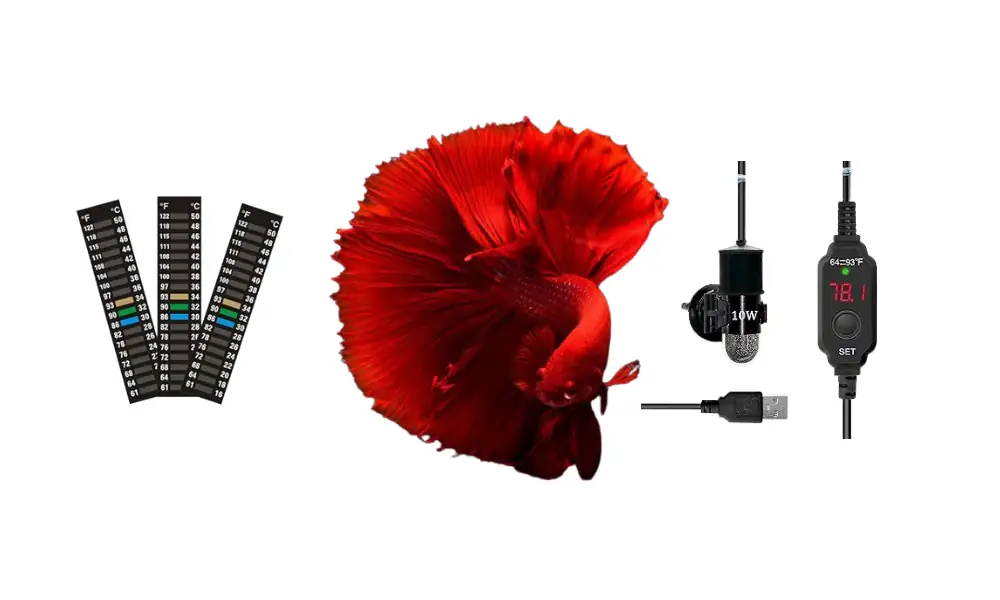When it comes to betta fish care, there must be a question about the temperature of the aquarium water. You can’t neglect the importance of betta water temperature in their health and well-being. Too hot and your betta might become stressed. Too cold and its immune system could weaken.
What exactly is the ideal temperature for betta fish and how can you maintain it consistently? What are the upper and lower limits of betta water temperature? To find out the answers to these questions, be with us till the end of this article.
Temperature in Betta’s Natural Habitats
To understand the temperature requirements of betta fish, we need to look at the temperature of their natural habitats. You know and we have also discussed it several times, that betta fish survive in tropical regions where the temperature ranges from 76°F to 82°F.
The tropical regions may undergo moderate temperature changes during the season and throughout the day and night. Bettas can tolerate slight temperature changes; however, sudden and drastic temperature shifts can harm your betta fish.
When the water becomes too hot in the wild, betta fish take shelter under leaves, driftwood or shaded and tannin-rich areas to seek cooler environments.
Ideal Temperature for Betta Fish
The universally accepted optimal range for betta water temperature is 78-82°F (25.5-27.8°C). A slight variation within this range and above or below the limits is acceptable.
It’s worth noting that the ideal temperature is not the same for every betta. It could be 78°F for one type of betta and 82°F for another betta. The perfect temperature is where betta exhibits the most active behavior and does not indicate any symptoms of illness or stress.
If your betta appears active and healthy at the temperature of 82°F, there’s no need to worry about the extra degree. The same we have experienced with my multiple bettas. For some bettas, the upper limit of the temperature, i.e., 81°F was working the best while for others the lower limit was suiting the well. However, they usually did well at warmer temperatures compared to colder ones.
Importance of Temperature Consistency
Betta fish are very weak at facing fluctuations, be they temperature or anything else. Abrupt changes in temperature can stress a betta fish, affecting its immune system. A daily temperature fluctuation of 1-2°F is acceptable, but larger changes can stress the fish. This increases the likelihood of infections such as fin rot, ich, also known as white spot disease or bacterial infection.
Handling Temperature Drops
If your betta is facing temperature drops, emergency measures must be followed.
- Use a heating pad wrapped around the tank.
- Place a warm and damp cloth against the tank exterior in a plastic bag.
- Avoid direct contact between heated objects and the water to prevent chemical leaching or burns.
Why a Heater is Necessary?
Maintaining a consistent water temperature in the betta tank is almost impossible without a heater. Remember, room temperature is not equal to betta tank temperature. Even if a room feels hot, water tends to be cooler due to evaporative cooling and possible heat transfer. For the tank to reach the necessary 78°F without a heater, the room must consistently stay above 80°F with high humidity, which is unrealistic for most homes.

Betta metabolism is severely affected by temperature fluctuations especially during the colder seasons. Seasonal changes like fall and winter, external weather changes and turning off indoor heating systems can drastically change the room temperature and ultimately the water temperature of the betta tank, which can stress your betta.
A reliable heater is very crucial to combat these sudden temperature drops. A good heater will automatically turn off when the desired temperature is reached, preventing overheating.
Read our completer article on the need of heater for your betta fish before buying it.
How to Safely Adjust Water Temperature
Water temperature needs to be safely adjusted to the required temperature instead of suddenly fixed. For that, special measures are to be carried out.
1. Use a Thermometer
The first step in maintaining a stable and accurate temperature of your betta tank is the measurement of the existing temperature. A reliable thermometer helps you determine the exact temperature of tank water. It measures the water temperature reading, you want to fix it. Without a good thermometer, it’s almost difficult for you to maintain a stable and accurate temperature in your betta tank.
2. Introduce a Heater Gradually
If you are a newbie and have just started setting up the tank, it is more likely your betta would be accustomed to room temperature. Let’s suppose it’s 64°F, which you measured with a thermometer. Now you need to introduce a heater.
The cautionary thing is not to fix the temperature at the ideal point. Rather, start by setting it to 70°F, then increase it by 2°F every few days until it reaches the ideal range. For that purpose, you’ll need to buy an adjustable thermometer instead of a preset one. It prevents your betta from temperature shock and allows you to make a gradual change, which allows our fish to acclimate without stress.
If the temperature reaches the target, i.e., 80°F sooner than expected, do not attempt to cool the water rapidly.
High Temperature Concerns for Betta Fish
Extreme Level of Temperature for Betta Fish
Compared to colder temperatures, betta fish are good at bearing warmer temperatures. While they can tolerate temperatures up to 86°F or slightly higher, prolonged exposure to warmer temperatures than their comfort zone can cause health problems for them. At higher temperatures usually above 86°F, the betta risks overheating, as warmer water holds less oxygen.
My own betta has faced temperatures up to 88°F, though it was for a very short duration but it’s not advisable. We mention the upper-temperature levels here not with the intention of achieving them in your betta tank but rather to address situations in case of an emergency.
Immediate Steps to Take During Extreme Temperature
If your betta remains active and eats well during a summer heatwave or at an extreme temperature, he is likely tolerating the heat temporarily. It does not mean keeping the betta at the given temperature but cooling the tank water to its comfort zone.
- Unplug the heater immediately so as not to let the temperature increase further.
- Turn off the tank lights and remove the lid to let heat escape from the top.
- Place fans near the water surface for increased water agitation to help cool the tank gradually.
- If still the temperature is not coming down, consider floating ice packs around the glass, not in direct contact with water, to avoid sudden drops in temperature.
Consequences of Warm Temperatures
If the water is too warm, your betta body goes into overdrive. Their heart rate and metabolism speed up, which sounds okay at first. But it can suffer your betta a lot before you realize it. Constant stress wears them down and can even shorten their lifespan. You might see them swimming frantically, gasping near the surface or just acting way too restless.
Low Temperature Concerns for Betta Fish
Lower water temperatures are more harmful for betta fish than higher temperatures. Cooler water can slow down their metabolism, which causes slow digestion and constipation. Long exposure to cooler temperatures can lead to lethargy and a lack of energy.
At advanced levels, it weakens the immune system of your betta, making them more vulnerable to bacterial, fungal and parasitic infections. Consistent exposure to temperatures below the ideal range can reduce the overall lifespan of betta fish.
You should get a heater to deal with low-temperature issues. If getting a new one takes time, use the methods mentioned below to raise the temperature without a heater in the meantime.
Increasing Water Temperature Without a Heater
If you can’t buy a heater for specific reasons or your existing one is malfunctioning, you may have concerns about increasing the water temperature of the betta fish tank without one. There are a few essential tips you’ll want to keep in mind.
- Place the tank in a naturally warmer room where the ambient temperature remains in the ideal range.
- Insulate the tank sides with a blanket, towel or any other clothing so as not to let escape the heat. Be sure not to cover the top of the tank.
- Position a small, low-voltage heat lamp above a tank at a reasonable distance.
- Use warm water during water changes and gradually introduce it to the tank to avoid temperature shocks.
Recognizing Temperature Stress in Betta Fish
Your betta can’t exactly tell you when something’s wrong but their body language says a lot. Your betta will start acting differently when the water temperature isn’t right. Catch these signs to fix the problem before it turns into something serious.
Signs the Water Is Too Cold
When the tank is too chilly, your betta body slows down. It will often become quiet and hang out near the bottom. You might notice:
- The betta may look lazy, barely moving around.
- His fins are clamped, meaning he is held tightly against the body.
- His colors might fade, making him look dull or pale.
- The betta stops eating, even if you offer him his favorite food.
Signs the Water Is Too Hot
If the tank is too warm, the betta metabolism speeds up too much and that stresses them out. The fish breathe fast or go to the surface like gasping for air. You’ll see frantic swimming or darting around like he is uncomfortable. He might even try to jump out of the tank.
Warmer water makes it harder for the fish to breathe due to less oxygen. Some bettas get stress stripes that are horizontal lines on their bodies when upset. Remember, stripes can also happen from other types of stress.
Try checking photos of healthy bettas and comparing them to pictures of stressed ones. You’ll start to notice the little changes like dull colors or weird swimming that can tell you something is bad. Sharing your own experiences or observing other betta tanks can also help you learn what normal looks like.




